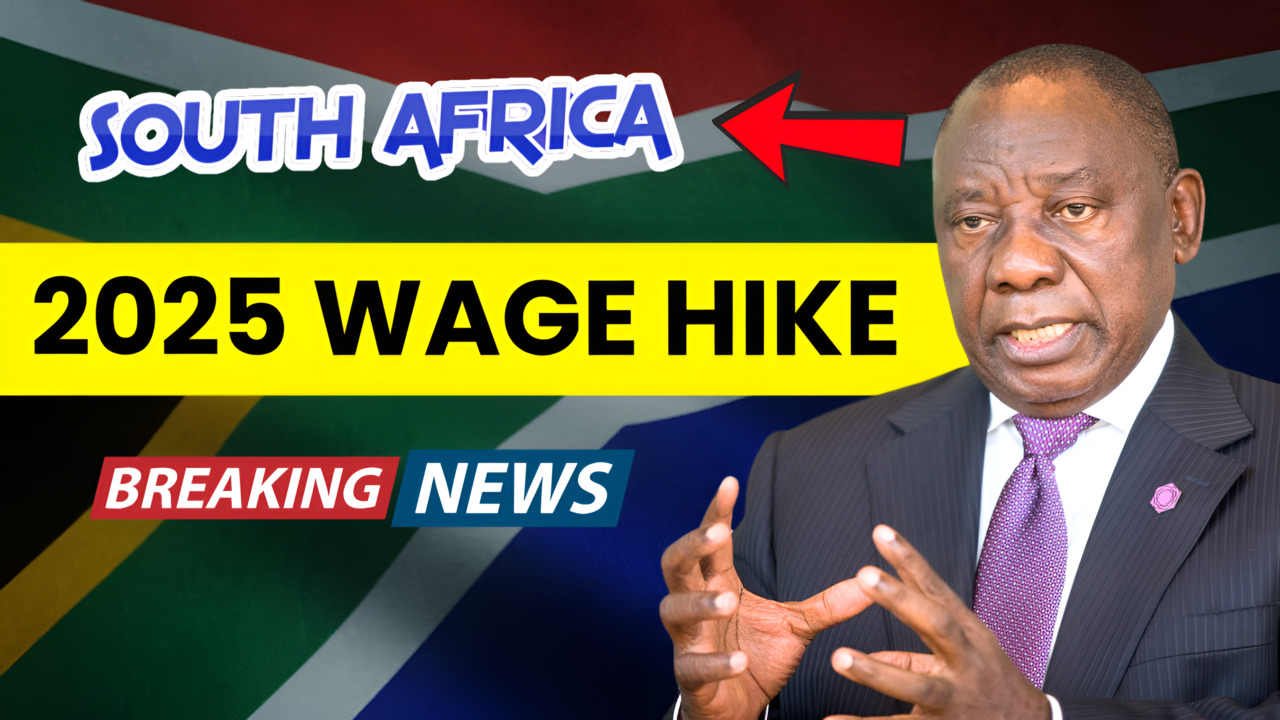In 2025, South Africa is implementing significant wage reforms aimed at addressing income inequality, improving living standards, and fostering economic growth. These changes include adjustments to the national minimum wage, public sector salaries, and additional employee allowances. This comprehensive guide delves into the key details of the wage hike, its implications, and what it means for workers across the country.
Why the 2025 Wage Hike Matters
The wage hike is a critical step in South Africa’s efforts to combat poverty and ensure fair compensation for workers. With inflation driving up the cost of living, the government’s decision to increase wages reflects its commitment to improving the financial well-being of its citizens. By boosting disposable income, the wage hike is also expected to stimulate economic activity and create a more equitable society.
Key Highlights of the 2025 Wage Hike
1. National Minimum Wage Increase
As of March 1, 2025, the national minimum wage will rise from R27.58 per hour to R28.79 per hour, marking a 4.4% increase. This adjustment ensures that minimum wage earners can better cope with rising living costs. For context, the revised wage equates to approximately $1.55 per hour in U.S. dollars.
2. Public Sector Salary Adjustments
Public sector employees, including teachers, healthcare workers, police officers, and administrative staff, will receive a 5.5% salary increase. This adjustment is designed to attract and retain skilled professionals in essential public services. The revised salaries will take effect in April 2025, with the first paychecks reflecting the increase issued shortly thereafter.
3. Enhanced Employee Allowances
In addition to wage increases, various allowances have been revised to provide further financial support to employees. Key changes include:
- Housing Allowance: Increased from R1,784 to R1,900, effective July 2025.
- Danger Allowance: Raised from R597 to R650, effective March 2025.
- Special Danger Allowance: Increased from R849 to R920, effective March 2025.
- Police Service Allowance: Adjusted from R700 to R920, effective March 2025.
These enhancements aim to improve the financial stability of workers in high-risk and essential roles.
Private Sector Wage Adjustments
Unlike the public sector, wage increases in the private sector vary by industry and company policies. Adjustments are typically aligned with inflation rates and collective bargaining agreements. For example:
- Mining Industry: Companies like Sibanye Stillwater have agreed to a 5.5% wage increase for skilled workers and an additional R900 monthly increase for lower-tier employees.
- Retail and Hospitality Sectors: Wage increases in these industries will be determined based on the Consumer Price Index (CPI) and union negotiations.
These sector-specific adjustments ensure that private sector employees also benefit from fair compensation.
Economic Implications of the Wage Hike
The 2025 wage hike is expected to have far-reaching economic implications, including:
- Increased Consumer Spending: Higher wages will boost disposable income, leading to greater spending on goods and services.
- Job Creation: The increased demand for goods and services is likely to stimulate job creation in various sectors.
- Reduced Income Inequality: By raising wages for low-income workers, the reforms aim to narrow the gap between the highest and lowest earners.
However, there are concerns about potential challenges, such as increased labor costs for businesses and the risk of inflationary pressures.
Timeline for Implementation
The wage and allowance adjustments will be rolled out over several months to ensure smooth implementation:
- March 1, 2025: National minimum wage increase becomes effective.
- April 2025: Public sector employees receive their first revised paychecks.
- July 2025: Housing allowance adjustments take effect.
- March – June 2025: Private sector wage adjustments are implemented based on company policies and agreements.
This phased approach allows employers and employees to adapt to the changes gradually.
Challenges and Considerations
While the wage hike is a positive development, it is not without challenges. Key considerations include:
- Business Compliance: Ensuring that employers adhere to the new wage regulations is critical for the success of the reforms.
- Inflation Risks: Higher wages could lead to increased prices for goods and services, potentially offsetting the benefits for workers.
- Sectoral Disparities: Variations in wage adjustments across industries may create inequalities among workers.
Addressing these challenges will require effective monitoring and enforcement by the government.
Conclusion
The 2025 wage hike in South Africa represents a significant step toward achieving economic equity and improving the quality of life for workers. By increasing the national minimum wage, adjusting public sector salaries, and enhancing employee allowances, the government is addressing the pressing need for fair compensation in the face of rising living costs.
While challenges remain, the reforms have the potential to drive economic growth, reduce poverty, and create a more inclusive society. As South Africa moves forward with these changes, the focus must remain on ensuring their successful implementation and addressing any unintended consequences.
F&Q
1. What is the new national minimum wage in South Africa for 2025?
R28.79 per hour, effective from March 1, 2025.
2. How much is the public sector salary increase in 2025?
A 5.5% salary increase for public sector employees.
3. When will the housing allowance increase take effect?
The revised housing allowance of R1,900 starts in July 2025.
4. Are private sector wages also increasing in 2025?
Yes, but adjustments vary by industry and company agreements.
5. What is the main goal of the 2025 wage hike?
To reduce income inequality and improve living standards.
